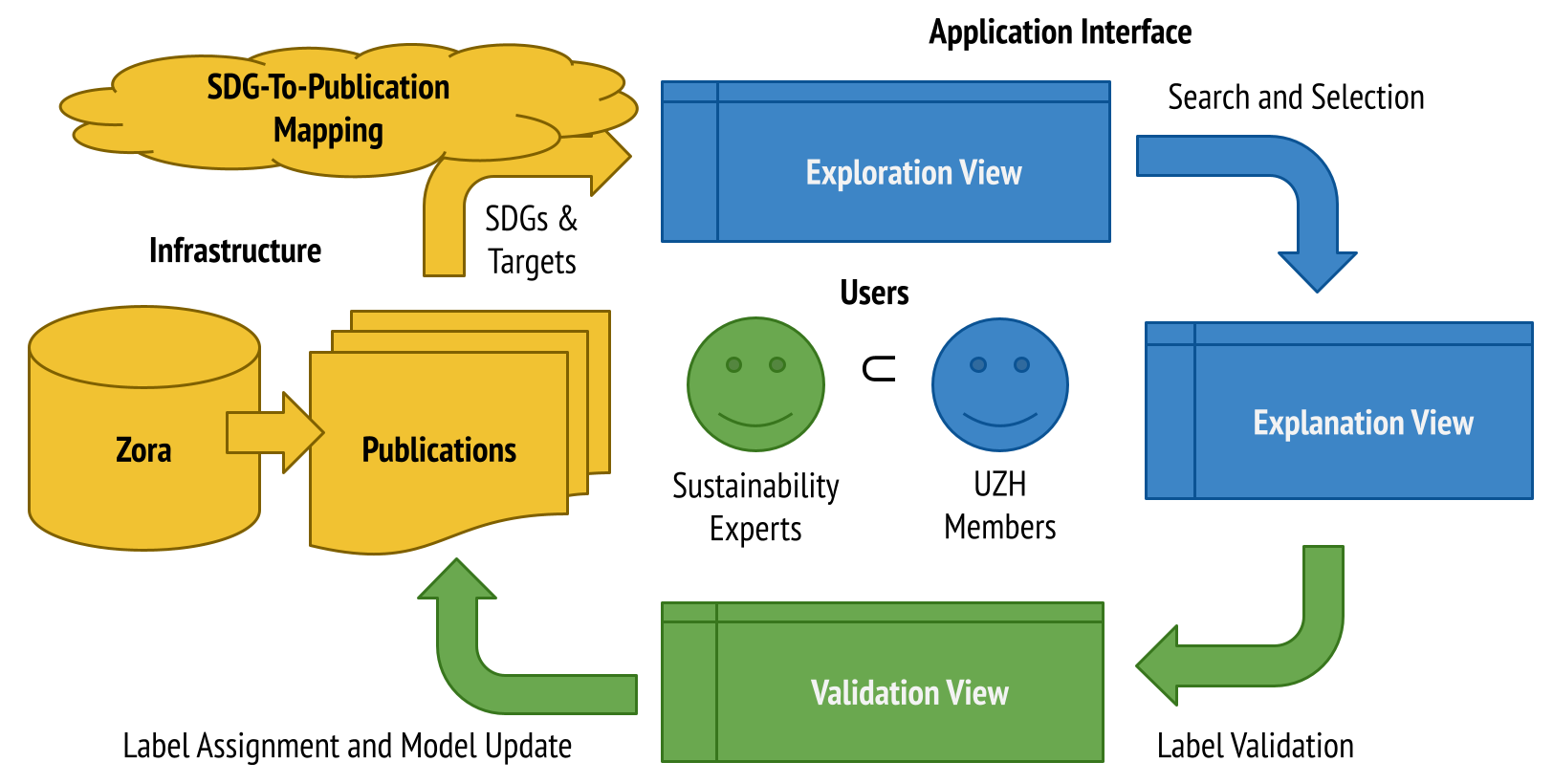Sustainable Development Goals Research Scout

Project Scope
The SDG Research Scout aims to use cutting-edge NLP, AI, and interactive visual data analysis to identify content relevant to the UN Sustainable Development Goals (SDGs) in scientific publications, making it easier for UZH members to engage with SDG-relevant research. SDG definitions are analyzed both at the goal and the target levels to get rich semantic information. By combining expertise from the Department of Informatics (IFI), the Department of Computational Linguistics (CL), and the Sustainability Team, the project will develop an intelligent system to identify and explore SDG-related output in ZORA.
Project Goal
.png)
The primary goal of the SDG Research Scout is to provide interactive data science support for UZH to enable effective mapping and relevancy assessment of SDG goals and targets for scientific publications by sustainability experts, and to help UZH members explore SDG-related publications interactively. The system will offer UZH members flexible and intelligent access to all UZH publications with relevance for the SDGs, and will serve as a pilot model for the combination of AI and sustainability research.
Research focus
.png)
The project will cover the following areas:
- Exploration: support users in finding publications related to particular SDG goals and targets, discovering related work, or identifying gaps in the research or data labels. Enable users to drill down to publications that are most relevant, by using filters or a search interface.
- Explanation: support users in understanding the predictions of the AI model. Users receive explanations for the SDG-to-publication mappings made by the model per document, through an interactive explanation interface. Two types of information are relevant here: a) text snippets of the publication that the classification model regarded as relevant for its decision, including AI-generated explanations; b) semantically similar publications that have already been classified with the corresponding labels. Users can assess the automatic mapping by using the explanations, leading to a more efficient and overall more consistent validation step. This is to have a means to critically assess AI-based predictions and as a starting point for classification model improvement.
- Validation and labelling: support sustainability Experts in validating the model SDG-to-publication mappings via an interactive validation interface. Validation of AI output is a promising and timely endeavor, considering the recent dialogue about the capabilities of AI tools and where their hidden limitations might be. Through validation and label confirmation, the experts efficiently extend existing datasets with high-quality labels on the level of main SDGs and create new innovative datasets on the level of fine-grained SDG targets. In the end, labels of human-validated high quality are added to the training data for the AI, serving as a basis for AI retraining and model improvement.
Organizational Information
The project will be supervised by Eduard Čuba andProf. Jürgen Bernard.
The project language is English, therefore, you are required to have good English knowledge (written and oral).
The tech stack of the project is not yet defined and is up for discussion (generally Python for the back end and JavaScript for the front end). The code will be versioned through GitLab and the tool will be hosted on the IFI server.
Your profile
You should have the following skills for this project:
- Interest in research and interactive visual data analytics
- Profound programming skills (JavaScript, Python, CSS, HTML)
- Basic web knowledge such as communication via a REST API
- Experience in working with version control systems (e.g. Git, we will be using GitLab)
- Basic knowledge of databases (especially NoSQL)
In addition, experience in some of the following areas is a plus:
- UI / UX design
- Front end frameworks such as ReactJS, Vue, Angular
- Data visualization frameworks such as D3.js, Three.js, or WebGL
- Front end libraries such as Bootstrap or Material Design
- Back end frameworks such as Django, Flask, FastAPI
- DevOps such as CI/CD and application deployment
How to Apply / Contact
Interested students should send their complete application to Prof. Jürgen Bernard.
Applications should include:
- Short, informal letter of motivation including your expectation for the project, the skills you want to learn, and your experience with data visualizations (if any)
- CV
- Transcript of records from your Master's and Bachelor's Degree
If you have any questions about the project, please feel free to contact Eduard Čuba orProf. Jürgen Bernard.